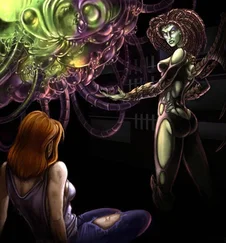Brian O'Grady - Hybrid
Здесь есть возможность читать онлайн «Brian O'Grady - Hybrid» весь текст электронной книги совершенно бесплатно (целиком полную версию без сокращений). В некоторых случаях можно слушать аудио, скачать через торрент в формате fb2 и присутствует краткое содержание. Год выпуска: 2011, ISBN: 2011, Жанр: Триллер, на английском языке. Описание произведения, (предисловие) а так же отзывы посетителей доступны на портале библиотеки ЛибКат.
- Название:Hybrid
- Автор:
- Жанр:
- Год:2011
- ISBN:1936558041
- Рейтинг книги:4 / 5. Голосов: 1
-
Избранное:Добавить в избранное
- Отзывы:
-
Ваша оценка:
- 80
- 1
- 2
- 3
- 4
- 5
Hybrid: краткое содержание, описание и аннотация
Предлагаем к чтению аннотацию, описание, краткое содержание или предисловие (зависит от того, что написал сам автор книги «Hybrid»). Если вы не нашли необходимую информацию о книге — напишите в комментариях, мы постараемся отыскать её.
Hybrid — читать онлайн бесплатно полную книгу (весь текст) целиком
Ниже представлен текст книги, разбитый по страницам. Система сохранения места последней прочитанной страницы, позволяет с удобством читать онлайн бесплатно книгу «Hybrid», без необходимости каждый раз заново искать на чём Вы остановились. Поставьте закладку, и сможете в любой момент перейти на страницу, на которой закончили чтение.
Интервал:
Закладка:
“One last thing, Doctor,” Linda Miller said. “The CDC has made an unusual request this morning. They want all our tissue samples on a case we sent them about six weeks ago, and they are to be delivered with stage four isolation precautions as soon as possible.”
Linda had been Phil’s secretary for seven years, and while she knew his habits and special needs quite well, she still didn’t know him on a personal level. She was loyal to his brilliance and need for perfection but not to the man. She had been offered other positions in the past, some with better pay and benefits, and she had secretly considered some of them. However, it always came down to a choice between personal or professional satisfaction. Rucker’s mood was always unpredictable: there were days when he was as he was now, approachable in his own unique way; and then there were days like yesterday, when he was savagely reclusive. Even at his best, he was a challenge. She wanted to like the people she worked for and with, but to like someone, you first have to know them. And long ago, she had resigned herself to the fact that she would never know Phillip Rucker. Still, she took great pride in being a part of a highly regarded group of experts, and Phillip Rucker, M.D., was the principal reason the Colorado Springs coroner’s department was hands down the best in all of Colorado, and one of the best in the nation. She couldn’t give that up, so she had stayed with him year after year.
“I remember that we sent them a case to review over a month ago,” Phil replied. He knew it had been exactly thirty-three days ago, but he had learned that sounding like Mr. Spock only made dealing with others that much more difficult. “They signed off on it without comment.”
“You may want to review it personally if the feds are starting to take a renewed interest in it.” She already had the case numbers and hard copies on his desk.
“I’ll do that right now,” he said, while sorting through the files. “Can you please get me the original slides, Linda?” Phil didn’t usually use her first name, and he was hoping that she would see it as a peace offering after yesterday’s unpleasantness.
“They are already loaded in your microscope,” she said flatly. It’s going to take more than that, Doctor , she thought.
“Thank you. I would also like to apologize if I in anyway offended you yesterday. You do an exceptional job, and I want you to know that I appreciate it.”
Linda paused and wondered what he meant by the word “appreciate.” Did he mean that he valued her work, or that he simply was aware that she did exceptional work? After seven years, she knew that he could only mean the latter, but this was as close to being appreciated as she would ever get, so long as she worked for him. “I appreciate that you’re aware of it,” she said. “Good-bye.”
Rucker turned to his microscope, glad that things had gone so well with his secretary. Now he could get to work with a clear conscience, or for what passed as one in his turbulent head. He turned the machine on, and while it warmed up, he opened the case file. Case 324-A23 was that of a thirty-nineyear-old man who in January was shot by the police during an armed confrontation with a neighbor. The report said that after shooting and seriously wounding his neighbor, the man opened up on the police who had responded to the 911 call. Apparently, the assailant was previously healthy and mentally stable. Further, he was married, a father of three, and employed — not exactly the profile of a man who attempts to kill his neighbor in a dispute over a lawnmower in the dead of winter.
The first pictures appeared on the screen, and Phil started scanning through the twenty-seven slides. It took only a few seconds to find the unidentified viral particles that Henry Gorman had described in his original report. Gorman was correct; the particles appeared only in the brain. The heart, lungs, liver, and kidneys were all normal. Gorman had good instincts, and if it weren’t for Phil, he would be the chief coroner now. Phil turned back to his desk and dialed an extension.
“Dr. Gorman, it’s Phillip Rucker. I’m glad you made it in. Nasty weather we’re having.” Phil was learning the art of small talk.
“What can I do for you, Phil?” Gorman was in his early sixties and would retire soon, never having been the head of the department he had been a part of for nearly forty years. Still, he harbored no ill will towards Phil and actually enjoyed the intellectual stimulation Phil offered. Most of their work was fairly cut and dried, and before Phil had taken over, complacency had infected the entire staff — sadly, including himself.
“About a month ago, you told me that you had a case of viral encephalitis that was sent on to the CDC. Do you remember it?” Phil respected Gorman’s opinion. He was a very experienced pathologist, and in this case, he had the advantage of actually having worked on it from the beginning. “I’m looking at the slides now, and I have never seen anything like this before.”
“I remember the case well. I took a pretty close look at what was left of the brain, which wasn’t much. He had a nine-millimeter entrance wound in his left frontal bone, and I found the bullet in the right occipital lobe. I took a lot more sections than usual because I couldn’t see a young father going crazy like that without a reason. He had all these inclusion bodies in the walls of his ventricles that were definitely pre-morbid. So I figured he had an encephalitis, right, probably viral, most likely an arbovirus. I know — there are no mosquitoes around in January, but by this point, I was grasping at straws. Did you see the electron micrographs?”
“Yes, I’m looking at them now,” Phil said, not entirely comfortable with Gorman’s familiarity.
“Well, those, my friend, are not arboviruses, either in season or out of season. I sat on the case for a week while I researched it, but I couldn’t find shit. Nothing ever published looks like that sucker. I thought it might be a new species, or some radical mutation of a herpes virus.”
Phil was about to ask Gorman why he had not consulted him about it, but then he thought better of it. If this did turn out to be a new species, or even a new dangerous mutation, Gorman would be credited with the find, and in today’s culture of instant fame, the credit could be considerable. This was one of the rare moments when Phil was happy that he was not burdened with the usual human nature. “I see,” he said. “So you sent it on for identification.”
“Yeah. We got an answer pretty quick. Let me see if I can find that.” Phil listened quietly as Gorman rummaged through his desk. “Oh hell, let me just look it up. .” His voice trailed off as he began to type at his keyboard. “Got it. Arboviral encephalitis. Signed, sealed, and delivered by the gods of the CDC, Special Pathogen Division.”
“They were wrong,” Phil said simply, staring at an electron micrograph of a six-sided viral particle.
“You think they just rubber-stamped it?” Gorman asked, with a subtly more professional tone. “It never sat well with me. I was hoping for something more interesting, and I have to admit that I was somewhat disappointed that they didn’t find it. Maybe my objectivity wasn’t as reliable as it should have been from the start, and after the CDC came back with arbovirus, I convinced myself that I was seeing things that weren’t there — the proverbial zebra in a herd of horses. So, I let it go. But there’s been this little voice in the back of my head that keeps screaming ‘bullshit’ whenever I roll that case around in my mind.”
Phil was quite familiar with little voices in his head, but the profanity made him wince. “Have you thought of anything else that might help shed some light on this case?”
Читать дальшеИнтервал:
Закладка:
Похожие книги на «Hybrid»
Представляем Вашему вниманию похожие книги на «Hybrid» списком для выбора. Мы отобрали схожую по названию и смыслу литературу в надежде предоставить читателям больше вариантов отыскать новые, интересные, ещё непрочитанные произведения.
Обсуждение, отзывы о книге «Hybrid» и просто собственные мнения читателей. Оставьте ваши комментарии, напишите, что Вы думаете о произведении, его смысле или главных героях. Укажите что конкретно понравилось, а что нет, и почему Вы так считаете.












